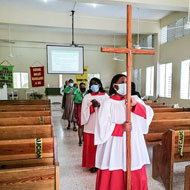
International Clergy Pension Plan: At-A-Glance
What Is the International Clergy Pension Plan?
The International Clergy Pension Plan (ICPP) is a pension plan administered by The Church Pension Fund (CPF) and is designed to provide eligible clergy serving in the non-domestic dioceses of The Episcopal Church and Iglesia Anglicana de la Región Central de América (IARCA) with a dependable source of income in retirement.
It also provides a source of income replacement to active clergy who become disabled and are unable to continue working as a result of their disability.
View A Guide to International Clergy Benefits for additional plan details (Ver la guía en español).
eLearning Course
Understanding the International Clergy Pension Plan
The information you’ll need to understand your pension benefit and other benefits The Church Pension Fund provides to eligible clergy.

Eligibility
A cleric is eligible to participate in the ICPP if he or she is canonically resident in:
- a diocese of The Episcopal Church and is working in a non-domestic diocese of the Church1, 2, or
- a diocese of IARCA3.
Participation
If you are an ordained Episcopal or IARCA cleric, participation in the ICPP is mandatory when you are compensated, regularly employed, and expected to work five or more consecutive months for the same Episcopal or IARCA employer. Participation is optional if your work is expected to last for less than five consecutive months.
Vesting
Vesting means you are entitled to receive a pension benefit from the ICPP upon your retirement. You become vested at the earlier of earning five years of Credited Service or turning age 65 or older while an active participant.
When can you begin receiving your vested pension benefits?
| Early Retirement | At or after age 55 |
| Normal Retirement | At or after age 65 |
| Mandatory Retirement Age4 | At age 72 |

Benefits Are Calculated Using Various Factors
Credited Service
The period of years and months that your employer or diocese has paid full Assessments on your Total Assessable Compensation and, if applicable, for which you have personally paid Assessments.
Highest Average Compensation
If you earn Credited Service on or after January 1, 2018, your Highest Average Compensation is generally the average of the seven highest-paid, non-overlapping, 12-month periods during which you earned Credited Service over your entire career.
Total Assessable Compensation
The basis for the amount your employer pays in Assessments. Your employer or diocese must pay 18% of your Total Assessable Compensation, which is the sum of the following annualized amounts: (1) base salary (excluding housing) and scheduled taxable cash payments; (2) cash housing allowance and/or utilities; (3) employer contributions to a qualified and/or non-qualified plan; (4) one-time payments; and (5) the value of employer-provided housing, which generally equals 30% of the sum of the four previous items.
How is your pension benefit calculated?
If you retire at or after the normal retirement age of 65, you will receive a normal retirement benefit as calculated below.
Highest Average Compensation (up to $10,000) x Credited Service (capped at 25 years) x 4.0%
Plus
Highest Average Compensation (in excess of $10,000) x Credited Service (uncapped) x 1.5%
= Your Total Annual Normal Retirement Benefit
If you retire before age 65, your annual pension benefit is subject to reduction unless you have earned 30 or more years of Credited Service.

Minimum Pension
As long as you are vested and eligible to retire, the ICPP provides you with an annual minimum pension equal to $120 times your Credited Service subject to a minimum of $2,400 and a maximum of $4,800. The minimum pension is subject to an early retirement reduction. (The ICPP also provides an eligible spouse with a minimum spousal pension, if greater than the 50% survivor option described below.)
Pension Payment Options
Zero Option:
With the single life or zero option, you will receive an enhanced monthly pension benefit for your lifetime. However, following your death, no survivor benefit will be paid.
50%, 75%, or 100% Joint and Survivor Options:
These options provide an actuarially-reduced benefit over your lifetime. Benefits are reduced because they will be paid beyond your lifetime. (If you have an eligible spouse, however, the cost of the 50% survivor option is fully subsidized by the ICPP.) In the event of your death, your beneficiary will receive a benefit equal to the percentage that you elected for their lifetime (that is, 50%, 75%, or 100%).
15-Year Certain and Life Option:
Under this option, you will receive a monthly pension benefit for your lifetime. If you die after receiving payments for 15 years, there will be no further benefits payable after your death. However, if you die before receiving payments for 15 years, then your beneficiary will receive a monthly benefit for the remainder of the 15-year period.

Discretionary Cost-of-Living Adjustment (COLA)
Every year, the CPF Board of Trustees determines whether to grant a discretionary COLA to retirees and beneficiaries in the ICPP. A discretionary COLA is granted when US inflation justifies it and the financial condition of the ICPP allows for it.
Periodic Purchasing Power Adjustment
In light of the fact that US inflation may not fully account for the impact of local inflation and exchange rates on ICPP retirees and beneficiaries, CPF conducts a periodic purchasing power adjustment analysis in order to determine whether ICPP retirees and beneficiaries living in a particular country have experienced a loss in purchasing power. CPF performs this type of analysis every three years and makes necessary adjustments when there has been a loss in purchasing power, with any such adjustment being capped at 5%. This benefit adjustment is in addition to any annual, discretionary COLA granted by the CPF Board.
The most recent benefit adjustment analysis examined the purchasing power of ICPP retirees and beneficiaries between October 1, 2020, and September 30, 2023, by country. If retired clergy or beneficiaries residing in a particular country were found to have suffered a loss in purchasing power, they are receiving a purchasing power adjustment effective January 1, 2024. Any clergy member who retired prior to January 1, 2024 (or their beneficiary) is receiving the adjustment if the retiree or beneficiary resides in the applicable country. For more information about recent pension benefit adjustments, see cpg.org/COLA.
Banking Fee Subsidy
In order to offset banking fees, CPF will provide you with a flat US $40 per month subsidy if you reside outside the US and receive your monthly benefit by foreign wire.
Disability Benefits (for Active Clergy Only)
If you become disabled and are unable to perform (or are limited in performing) the material and substantial duties of your own job or you have given birth to a child, you may be eligible for short-term disability benefits. If your disability continues for 26 weeks or longer, you may be eligible for long-term disability benefits. You must be an active participant in the ICPP in order to be eligible for short-term and/or long-term disability benefits.
Other Benefits (depending on your status in the ICPP)
You, your eligible spouse, eligible children, or other eligible designated beneficiaries may also receive:
- Christmas Benefit
- Resettlement Benefit
- Major Medical Supplement*
- Death Benefits
* Effective January 1, 2021, the Major Medical Supplement increased to US $170 per month per eligible individual. This amount is subject to reduction if you earned less than 20 years of Credited Service under the ICPP.
Questions?
Please call a Client Services representative at +1 (866) 802-6333, Monday to Friday, 8:30 AM to 8:00 PM ET. Please let us know if you need an interpreter, and we can make one available to assist you with your call.
1 The non-domestic dioceses of The Episcopal Church are Central Ecuador, Colombia, Cuba, Dominican Republic, Haiti, Honduras, Litoral Ecuador, Taiwan, Venezuela, and Virgin Islands (British only). Please note that if you are a cleric serving in the Diocese of Puerto Rico, you participate in the ICPP for tax reasons. However, the benefits that you receive are identical to the benefits described in “A Guide to Clergy Benefits.” You should use that guide as your reference but understand that the tax treatment of your benefits may be different.
2 Episcopal clergy serving in a domestic diocese of the Church, or in the Convocation of Episcopal Churches in Europe, participate in The Church Pension Fund Clergy Pension Plan, not in the ICPP.
3 The IARCA dioceses are Costa Rica, El Salvador, Guatemala, Nicaragua, and Panamá.
4 This is the mandatory retirement age in The Episcopal Church. If you are an IARCA cleric, your bishop or diocese may require that you retire at age 70. In no event can you delay your retirement beyond age 72.
Please note that this document is only a high-level summary of the ICPP and eligibility requirements and other conditions may apply to the benefits described herein. This material is provided for informational purposes only and should not be viewed as investment, tax or other advice. It does not constitute a contract or an offer for any products or services. In the event of a conflict between this material and the official plan documents or insurance policies, the official plan documents or insurance policies will govern. The Church Pension Fund and its affiliates retain the right to amend, terminate, or modify the terms of any benefit plan and/or insurance policy described in this material at any time, for any reason, and, unless otherwise required by law, without notice. In case of a conflict between the English version of this material and any of the Chinese, French, and Spanish versions, the English version will govern.
You will be redirected to a new tab for live remote support. Please confirm you're on a call with a Client Services team member to continue.